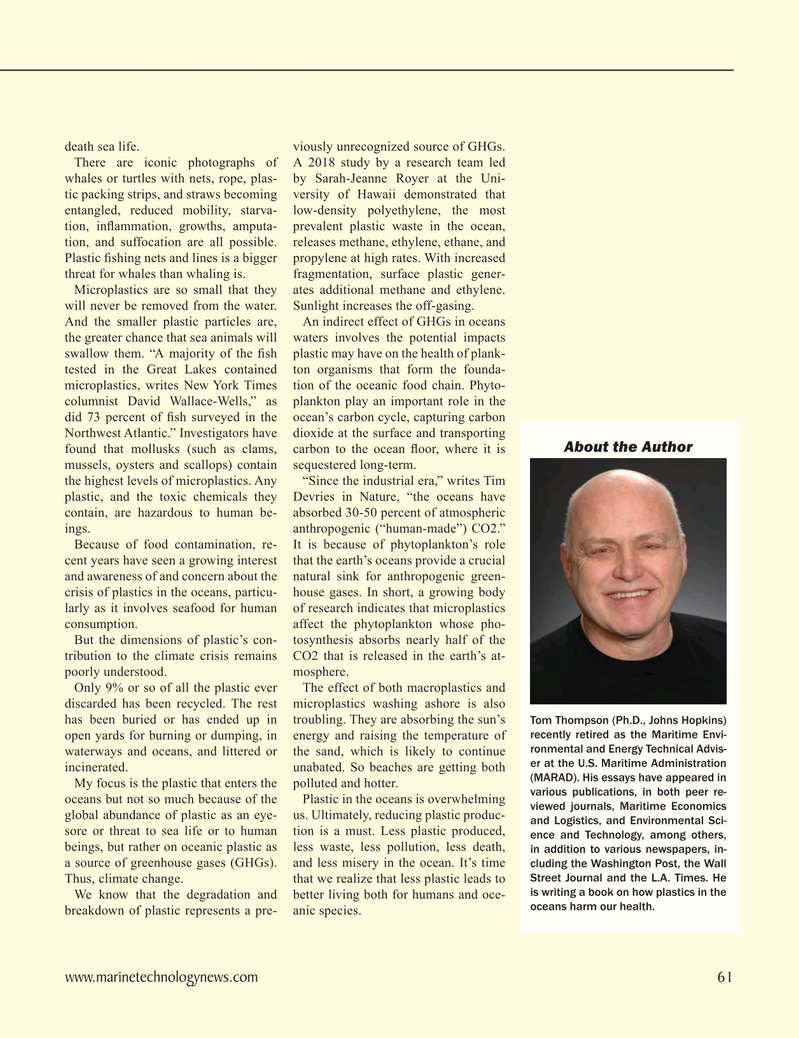
Page 61: of Marine Technology Magazine (March 2023)
Read this page in Pdf, Flash or Html5 edition of March 2023 Marine Technology Magazine
death sea life. viously unrecognized source of GHGs.
There are iconic photographs of A 2018 study by a research team led whales or turtles with nets, rope, plas- by Sarah-Jeanne Royer at the Uni- tic packing strips, and straws becoming versity of Hawaii demonstrated that entangled, reduced mobility, starva- low-density polyethylene, the most tion, in? ammation, growths, amputa- prevalent plastic waste in the ocean, tion, and suffocation are all possible. releases methane, ethylene, ethane, and
Plastic ? shing nets and lines is a bigger propylene at high rates. With increased threat for whales than whaling is. fragmentation, surface plastic gener-
Microplastics are so small that they ates additional methane and ethylene. will never be removed from the water. Sunlight increases the off-gasing.
And the smaller plastic particles are, An indirect effect of GHGs in oceans the greater chance that sea animals will waters involves the potential impacts swallow them. “A majority of the ? sh plastic may have on the health of plank- tested in the Great Lakes contained ton organisms that form the founda- microplastics, writes New York Times tion of the oceanic food chain. Phyto- columnist David Wallace-Wells,” as plankton play an important role in the did 73 percent of ? sh surveyed in the ocean’s carbon cycle, capturing carbon
Northwest Atlantic.” Investigators have dioxide at the surface and transporting
About the Author found that mollusks (such as clams, carbon to the ocean ? oor, where it is mussels, oysters and scallops) contain sequestered long-term. the highest levels of microplastics. Any “Since the industrial era,” writes Tim plastic, and the toxic chemicals they Devries in Nature, “the oceans have contain, are hazardous to human be- absorbed 30-50 percent of atmospheric ings. anthropogenic (“human-made”) CO2.”
Because of food contamination, re- It is because of phytoplankton’s role cent years have seen a growing interest that the earth’s oceans provide a crucial and awareness of and concern about the natural sink for anthropogenic green- crisis of plastics in the oceans, particu- house gases. In short, a growing body larly as it involves seafood for human of research indicates that microplastics consumption. affect the phytoplankton whose pho-
But the dimensions of plastic’s con- tosynthesis absorbs nearly half of the tribution to the climate crisis remains CO2 that is released in the earth’s at- poorly understood. mosphere.
Only 9% or so of all the plastic ever The effect of both macroplastics and discarded has been recycled. The rest microplastics washing ashore is also has been buried or has ended up in troubling. They are absorbing the sun’s
Tom Thompson (Ph.D., Johns Hopkins) recently retired as the Maritime Envi- open yards for burning or dumping, in energy and raising the temperature of ronmental and Energy Technical Advis- waterways and oceans, and littered or the sand, which is likely to continue er at the U.S. Maritime Administration incinerated. unabated. So beaches are getting both (MARAD). His essays have appeared in
My focus is the plastic that enters the polluted and hotter.
various publications, in both peer re- oceans but not so much because of the Plastic in the oceans is overwhelming viewed journals, Maritime Economics global abundance of plastic as an eye- us. Ultimately, reducing plastic produc- and Logistics, and Environmental Sci- sore or threat to sea life or to human tion is a must. Less plastic produced, ence and Technology, among others, beings, but rather on oceanic plastic as less waste, less pollution, less death, in addition to various newspapers, in- a source of greenhouse gases (GHGs). and less misery in the ocean. It’s time cluding the Washington Post, the Wall
Street Journal and the L.A. Times. He
Thus, climate change. that we realize that less plastic leads to is writing a book on how plastics in the
We know that the degradation and better living both for humans and oce- oceans harm our health.
breakdown of plastic represents a pre- anic species.
www.marinetechnologynews.com 61
MTR #3 (50-63).indd 61 3/20/2023 1:04:36 PM

 60
60

 62
62
